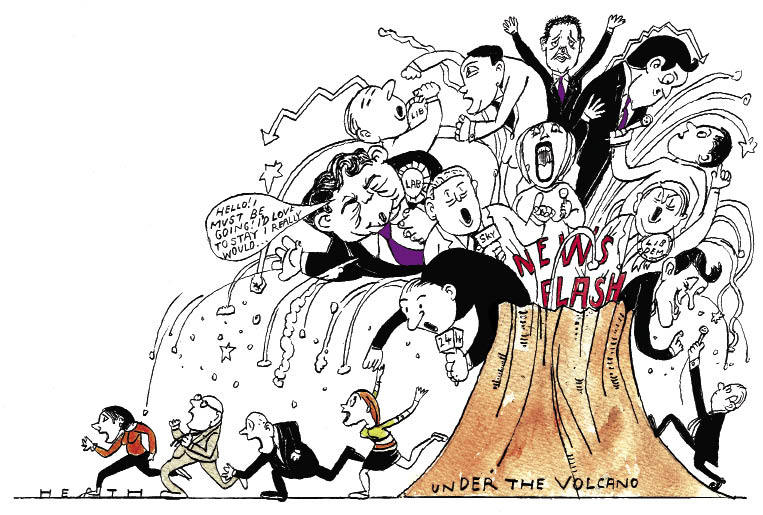Five days after the general election, Mr David Cameron, the leader of the Conservative party, accepted the Queen’s request to form an administration and kissed hands upon his appointment as Prime Minister, the 12th of her reign, and at 43, the youngest since Lord Liverpool.
Five days after the general election, Mr David Cameron, the leader of the Conservative party, accepted the Queen’s request to form an administration and kissed hands upon his appointment as Prime Minister, the 12th of her reign, and at 43, the youngest since Lord Liverpool. In Downing Street he announced a ‘full coalition’ with the Liberal Democrats. Mr Nick Clegg, the leader of the Liberal Democrats, became deputy Prime Minister; Mr George Osborne, aged 38, Chancellor of the Exchequer; Mr William Hague Foreign Secretary; Mr Vince Cable, a Liberal Democrat, Business Secretary; Mrs Theresa May, Home Secretary; Mr Ken Clarke, Justice Secretary, Mr Michael Gove, Education Secretary; Dr Liam Fox Defence Secretary. Mr Gordon Brown had announced his resignation as Prime Minister and leader of the Labour party earlier that evening. Miss Harriet Harman, a kinswoman of David Cameron’s, became acting Labour leader. The day before Mr Brown had said he would resign as leader, in the hope of attracting the Liberal Democrats to a coalition. They had already spent three days in talks with the Conservatives after Mr Cameron had said in a speech the day after the election: ‘I want to make a big, open and comprehensive offer to the Liberal Democrats.’ The arithmetic of parliamentary majorities had been tantalising, with a Labour coalition with the Liberal Democrats falling just short of a majority, and a Conservative alliance with minor parties doing the same.
In the election the Conservatives had won 306 seats, a gain of 97, with one more expected on 27 May, when Thirsk votes; Labour won 258, a loss of 91; the Liberal Democrats won 57, five fewer than in 2005. The share of the vote was: Conservatives 10,706,647 (36.1 per cent); Labour 8,604,358 (29 per cent); Liberal Democrats 6,827,938 (23 per cent). The turnout was 65.1 per cent. The British National Party and the UK Independence Party won no seats. Mr Nigel Farage, the Ukip politician, was injured in a light aircraft crash on election day. The Speaker kept his seat. Among notables to lose theirs were Mr Peter Robinson, the First Minister of Northern Ireland and leader of the Democratic Unionists; Miss Jacqui Smith, the former Home Secretary; Mr Lembit Opik, the Liberal Democrat former lover of one half of the Cheeky Girls; Dr Evan Harris, a Liberal Democrat with strange, staring eyes; and Mr George Galloway, formerly an MP for Respect. Miss Caroline Lucas won a seat for the Greens. Queues of voters had formed at polling stations in London and the provinces and hundreds were locked out when they closed at 10 p.m. The Unite union announced 20 more days of strikes for British Airways cabin crew, beginning with four days from 18 May. Mr Mohamed Fayed sold Harrods for £1.5 billion to Qatar Holdings, which invests on behalf of the Qatari royal family.
The European Union agreed a scheme to save the financial stability of the eurozone, strained by the debts of Greece. The 16 eurozone members would provide E440 billion of loan guarantees, with another E60 billion of emergency funding from the European Commission, of which the British share would be perhaps £8 billion. The International Monetary Fund will also contribute up to E250 billion. This cheered up the markets. The Greek parliament had already approved austerity measures. Spain made public-spending cuts. Mr Hreidar Mar Sigurdsson, the former chief executive of the collapsed Icelandic bank Kaupthing was arrested and held in solitary confinement. BP failed in its attempt to lower a 100-ton funnel on to an oil-leak 5,000 feet beneath the Gulf of Mexico, which had been adding 176,000 gallons a day to the slick nudging the shores of Louisiana. Another attempt went ahead with a smaller funnel. The US administration announced the splitting up of the Minerals Management Service, which inspects oil rigs and oversees drill leases. A Russian warship freed 23 crew from Somali pirates who had captured a tanker of Yemen with oil worth £33 million; a pirate was killed, but ten taken prisoner were later released because of the complications of prosecuting them.
Mr Goodluck Jonathan was sworn in as President of Nigeria after the death of President Umaru Yar’Adua, who had been ill for months. The surviving terrorist convicted of taking part in the attacks on Bombay in 2008 was sentenced to death in India. Maoists enforced closure of shops in Kathmandu for a week. In China, 20 people in every 100,000 carry syphilis, according to the New England Journal of Medicine. On pilgrimage to Fatima in Portugal, Pope Benedict said: ‘The biggest persecution of the Church comes not from the enemies outside but is born from sin inside the Church.’ Mr Tako Dabi, the home minister of Arunachal Pradesh, proposed the formation of a regiment of eunuchs for international border patrol. CSH






Comments